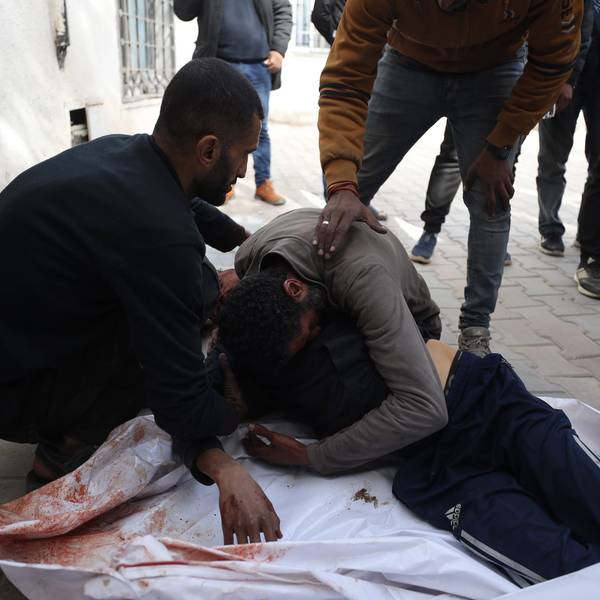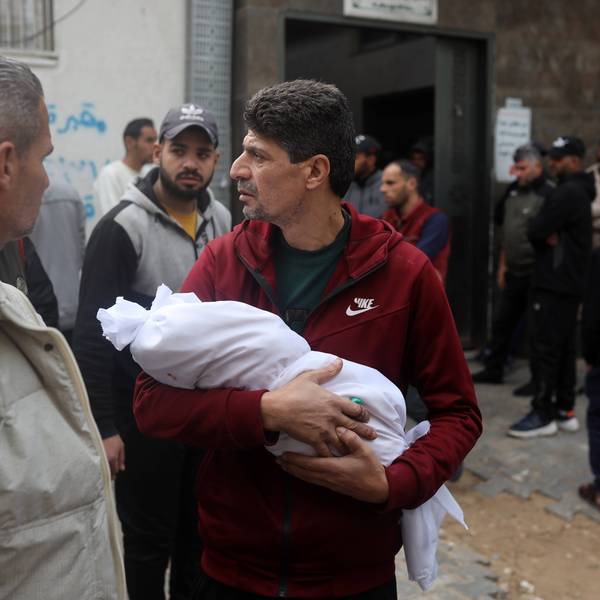Saeb Erekat, the politician and diplomat who served as Palestine's chief negotiator during the Oslo peace talks between the Palestine Liberation Organization and Israel, died Monday from Covid-19 at the age of 65.
The BBC reports Erekat died in an Israeli hospital in Jerusalem, where he had battled Covid-19 since being rushed there on October 18, 10 days after testing positive for coronavirus.
Palestinian President Mahmoud Abbas hailed Erekat--who served as his longtime adviser and also as secretary general of the PLO since 2015--as "our dear brother and friend, the great fighter," and said his death "represents a great loss for Palestine and our people."
Born in 1955 in the village of Abu Dis in Israeli-occupied Jerusalem, Erekat was a lifelong fighter for the Palestinian cause. At the age of 12, he was jailed for a year for writing anti-occupation graffiti and throwing stones at Israeli troops when they illegally occupied the West Bank in 1967.
After earning undergraduate and master's degrees in San Francisco and a Ph.D. in peace and conflict studies from Bradford University in England, Erekat returned to Palestine, where he taught political science at An-Najah National University in Nablus and served as an editor for the popular newspaper Al Quds.
In 1991, Erekat was appointed by the late PLO and Fatah President Yasser Arafat as deputy chief negotiator at the Madrid Peace Conference, leading to the chief negotiator role that would earn him international recognition during the talks, which resulted in the signing of the landmark--but deeply flawed--Oslo Accords in 1993.
While many Palestinians resented Erekat's embrace of a two-state solution to the crisis caused by the establishment of the modern state of Israel through the ethnic cleansing and occupation of Palestine, he nevertheless remained a fierce critic of Israeli policies and actions. Erekat called for sanctions against Israel for its illegal occupation and settler colonization and also backed a boycott of Israeli companies for their complicity in these crimes.
Erekat was also highly critical of the Trump administration's so-called peace plan, accusing the U.S. of "complicity with Israeli colonial plans."
"The Israeli-U.S. coordination is not about achieving a just and lasting peace but about legitimizing Israeli violations of International law and U.N. resolutions," Erekat said in February 2018. "Israel's annexation of Palestinian lands means the denial of the inalienable rights of the Palestinian people to self-determination and independence, further Israeli colonization, the destruction of the two-state solution, and the consolidation of the current reality of Israeli apartheid."
After President Donald Trump recognized Jerusalem as the capital of Israel, Erekat declared that "the two-state solution is over. Now is the time to transform the struggle for one state with equal rights for everyone living in historic Palestine."
Most recently, Erekat was closely involved in the decision by Palestinian leadership to cease cooperation with the Israeli government over its criminal plan to annex large swathes of the little remaining Palestinian territory not already seized over the decades since the Nakba conquest and ethnic cleansing campaign of 1948-49.
"I'm one of the ones who promised Palestinians, that once we recognize Israel, once we renounce violence, once we accept the two-state solution, once we negotiate, then we can have our independence," Erekat lamented in May 2020. "Who will be the Palestinian in the next 1,000 years looking at my experience and what we've done? Who will be willing to sit with the Israelis at the table?"
Erekat had been in poor health since receiving a lung transplant in the U.S. in 2017. The doctors treating him in Jerusalem said he suffered from a weakened immune system and a bacterial infection in addition to being infected with coronavirus. He remained determined to the end, recently writing to former Israeli Foreign Minister Tzipi Livni--who sat across the negotiating table from him in Oslo--that "I'm not finished with what I was born to do."
"I overcame a lung transplant, and I'll defeat this Covid," he wrote.




